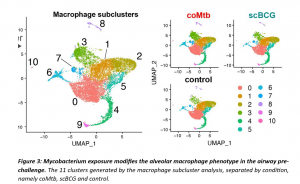Lung resident alveolar macrophages (AMs) are the first immune cells that Mycobacterium tuberculosis (M.tb) encounter in the lungs, and play a protective role in the host’s ability to defend itself following M. tb exposure.
Previous work showed that M.tb infection played a role in eliciting a cell-protective response by the host’s alveolar macrophages, thus allowing these cells to control the growth of the bacteria. However, in the present study, the researchers examined this further by using a murine model to evaluate whether previous exposure to Mycobacterium tuberculosis leads to a reprogramming of AMs and in turn, altering their innate response to subsequent infection (Figure 1). Through comparing the alveolar macrophage response following two modalities of Mycobacterium exposure, notably subcutaneous BCG vaccination (scBCG) and contained M.tb infection (coMtb), the authors noted differences in the innate response with the scBCG approach gearing towards a strong interferon response and the coMtb exhibiting a broader pro-inflammatory response.
Interestingly, when the authors evaluated the macrophage profile (by examining markers associated with macrophage subclusters prior to aerosol challenge) using scRNAseq, it showed different subcluster frequencies between the scBCG and coMtb samples. This supports the notion that the different Mycobacterium exposure methods drive the AM phenotype in diverse directions.
Thus, the findings highlighted in the study show that prior Mycobacterium exposure leads AMs to undergo significant remodelling, which results in cell-intrinsic changes, as well as contributes to alterations in the lung micro-environment. This discovery offers an interesting research avenue for targeted functioning of AMs as the method of Mycobacterium exposure could remodel these cells and holds potential for vaccination methods and potential host-directed therapies.
Journal article: Mai et al., 2024. Exposure to Mycobacterium remodels alveolar macrophages and the early innate response to Mycobacterium tuberculosis infection. PLOS Pathogens.
Summary by Mbali Mkhonza











